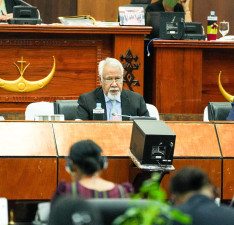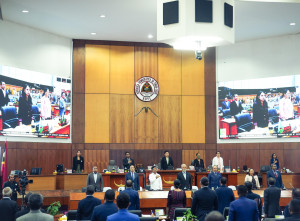Today, November 6th, 2024, the 9th Constitutional Government presented the Draft Law on the 2025 General State Budget (GSB) to the National Parliament under the theme “Investment in Strategic Infrastructure, Strengthening the Economy and Improving the Welfare of Citizens”. With a total budget of US$2.617 billion, the Government reaffirms its commitment to sustainable development and improving the living conditions of all Timorese.
In his speech, Prime Minister Kay Rala Xanana Gusmão emphasised that the 2025 GSB is “more than a mere collection of figures and allocation of funds: it is a declaration of intent; a bold vision for the future; and a concrete roadmap for facing the challenges and taking advantage of the opportunities”. With this proposal, the Government wants to ensure that all citizens, “regardless of where they live or their social position”, enjoy the “fruits of growth and development”. “This is a budget for the people and by the people,” said the Prime Minister. 
Referring to the global context, Kay Rala Xanana Gusmão emphasised that in the face of “unprecedented uncertainties”, the “Government has drawn up a budget that takes into account the people’s needs, also in this context of vulnerability to external factors”, and that does not focus “only on immediate recovery, but also on building resilient policies and measures that will allow Timor-Leste to prosper in the long term”.
The Prime Minister emphasised the importance of investing in productive sectors such as infrastructure, education, health, social and environmental protection, and the oil sector, stressing that “these are the pillars on which we will build a prosperous and just society”. Among the leading investment areas, the Prime Minister highlighted the strengthening of strategic infrastructure, with an allocation of US$ 654 million, emphasising that these funds “are not limited to building roads and bridges – they are intended to connect our people, enable trade and promote opportunities”.
The Head of Government also emphasised the importance of sustainable management of water resources and environmental protection, particularly in urban areas. “The Government has committed a total of US$26 million to Water, Sanitation and Hygiene initiatives in various municipalities, focusing on infrastructure development and maintenance”, he emphasised. Another critical point in the budget is the investment in improving internet connection, with a sum of “US$2.5 million for the fibre optic installation project and US$5 million for its management”, as well as the “approval of licences for internet services” which, according to the Prime Minister, will allow “the improvement of economic indicators and the development of new industries that would previously have been impossible”.
The budget proposal also allocates a significant sum of “US$741 million, or 35 per cent of the consolidated budget, to the social capital sector”, focusing on supporting the most vulnerable populations and recognising the sacrifice of veterans. “By allocating US$190 million to our veterans, we honour their sacrifice and recognise that the freedom and peace we enjoy today were won thanks to their courage”, said Kay Rala Xanana Gusmão. The budget also includes “a transfer of US$124 million to Social Security” and a reinforcement of the Bolsa da Mãe (Mothers Allowance) programme, now with a total amount of US$7 million and an additional US$2 million allocated for a conditional health and nutrition subsidy for pregnant women and children. Concerning health, the Government will allocate around US$92.2 million to improve access to health services throughout the country, in addition to an investment of US$14 million in essential medicines and equipment. 
Addressing the issue of economic development, the Prime Minister emphasised support for the private sector, especially agriculture and small and medium-sized enterprises, stating that “we know that real economic strength comes from within, and we are committed to developing local industries that can stand the test of time”. To this end, US$40.8 million has been allocated to stimulate productive sectors such as agriculture, fishing and livestock, aiming to “increase local production, reducing dependence on imports and promoting innovation”.
Regarding the oil sector and natural resources, the Prime Minister revealed an investment of US$40.5 million, with an additional US$12 million going towards developing the Greater Sunrise project. “We can’t stop betting on the resources that nature has placed at our disposal so that we can grow and prosper”, he emphasised.
In the area of education, considered by Kay Rala Xanana Gusmão to be “the great equaliser”, the budget provides US$145.8 million for educational infrastructure, teacher training and improving the education management system, and US$17.2 million for scholarships. “We are preparing the next generation of Timorese leaders, innovators and agents of change”, he declared, adding that “the success of our nation rests on the shoulders of our young people, and we are committed to giving them the tools they need to succeed”.
The Prime Minister reaffirmed the Government’s commitment to good governance and transparency, guaranteeing that it will “ensure that public funds are managed with maximum transparency and responsibility.” He also emphasised the need to implement stronger public finance management systems, strengthen internal auditing mechanisms, and fight corruption. “Corruption and mismanagement have no place in Timor-Leste’s future,” he said.
Lastly, the Head of Government emphasised that “this budget represents a turning point for our nation. It is about investing in our future, about ensuring that Timor-Leste emerges from the challenges we currently face as a stronger, more united, and more prosperous country”.
The Prime Minister ended his speech with a call for national unity, stating that “as we face global and internal challenges, we must remember that our strength lies in our unity and resilience” and “together, we will do everything we can to build that future – a future built on foundations of social justice, stability and mutual trust”.
The discussion and vote in general terms will take place until November 8th, with the special analysis and final vote scheduled for November 11th to 25th.